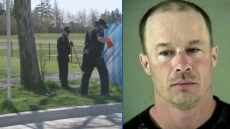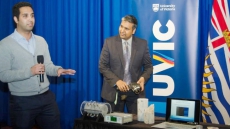HAMILTON — Two men who were prosecuted — and one of them wrongfully convicted — in the murder of a Hamilton school teacher have lost a lawsuit against the police force and officers who arrested them.
Christopher McCullough spent nine years behind bars for the murder of Beverly Perrin, 55, before being freed on appeal in 2000 after fresh DNA evidence emerged.
Nicholas Nossey was also charged in the slaying but was acquitted by a jury in 1991.
They sued the Hamilton Police Services Board and four investigators for malicious prosecution, false imprisonment, negligent investigation and breach of the Charter of Rights.
The suit, which sought millions in damages, alleged homicide investigators lied, withheld evidence and rewarded jailhouse informants for perjured testimony.
But Ontario Superior Court Judge James Ramsay says the officers were "acting carefully and in accordance with sound police practice" during their investigation and consulted the Crown before making any arrests.
If anyone is to blame for Nossey's plight, it is the three witnesses who falsely linked him to the crime, Ramsay said in his decision.
"If McCullough was victimized, that too was their fault," the judge said.
Ramsay said that though the witnesses contradicted themselves, their accounts were enough to justify the two arrests at the time.
Neil Jones, who represented McCullough and Nossey, said his clients were "not happy about the outcome."
"The murder that occurred here was horrific, you can't even think of the words to describe it. And to be charged, to be wrongly charged with that, is unimaginable, but that's what they've had to live with until now and will continue to have to live with."
He said they have not yet decided whether to appeal.
John McLennan, risk manager for the city of Hamilton, said the judge came to the "right decision."
"What the finding tells you is that yes, there was reasonable grounds for both McCullough and Nossey to be arrested," he said. "The fact that someone does not get convicted does not mean that the arrest was not reasonable; that's why we have trials."
Perrin disappeared on Feb. 13, 1989, after going to the hospital to visit her husband, who was recovering from a cancer surgery. Her body was found in a field two days later.
Her car was found in a garage a day after that, jacked up with the two rear tires missing. The tires were never found, but a confidential informant told police a man named Terry Pearce had talked about selling them.
Months later, another source told police Pearce had confessed to driving Perrin's car the night of the murder.
Officers set up wiretaps on Pearce in March of 1990, then arrested and released him the same day. In his interrogation, Pearce pointed the finger at a man named Steven Clarke, who he said had confessed to being the driver that night.
Clarke denied any involvement in the murder and once again cast Pearce as the driver. Through the wiretaps, "it became clear that Pearce and Clarke were associates," the ruling said.
It also became clear that Clarke thought McCullough and another man had ratted them out to police, the document said.
The information obtained from Clarke, Pearce and Pearce's girlfriend, Tammy Waltham, provided the basis for McCullough and Nossey's arrests.
Though the trio's story's changed repeatedly, Pearce eventually admitted to driving the vehicle and said McCullough had raped and killed Perrin, the decision said. Waltham, meanwhile, said McCullough and another man had come to pick up her boyfriend that night.
McCullough was arrested in May 1990 and charged with first-degree murder. Pearce was charged that same day with forcible confinement and accessory after the fact of murder, and released on bail a few days later.
Clarke later implicated McCullough as well, and after initially maintaining his own innocence, admitted to being in the car with McCullough, Pearce and a fourth man before the murder took place.
Pearce, his girlfriend and Clarke eventually identified the fourth man as Nossey, though each had previously pointed the finger at other men.
Clarke later admitted to police that he was present for the murder. He was charged with forcible confinement and accessory after the fact of murder. Nossey and Pearce were charged with first-degree murder.
Pearce pleaded guilty to manslaughter in 1992 and received a seven-year sentence. Clarke pleaded guilty to forcible confinement and being an accessory after the murder was sentenced in December 1990 to four years in prison.
McCullough was found guilty of second-degree murder and sentenced in 1991 to life in prison with no parole for 18 years.
While in prison, he was accused and convicted of trying to have Clarke killed.
An admitted jailhouse snitch later told the appeal court that he entrapped McCullough into organizing the hit on Clarke by convincing him that it was the only way to win an acquittal in the murder he had nothing to do with.
The informant also testified that he told Hamilton-Wentworth Regional police in 1992 that Clarke had confessed to killing Perrin by himself but that they wouldn't listen.
Waltham also recanted her testimony during McCullough's appeal.
Forensic evidence also played a key role in overturning McCullough's conviction. Two paper napkins found near where Perrin's body was found were originally reported to contain "no significant findings," but were later found to contain semen and pubic hairs that did not match McCullough or the other accused.
The appeal court overturned the conviction and unanimously ordered a new trial in 2000. The Crown declined to proceed.
Nossey filed his suit in 1992 and McCullough in 2000, and the two were eventually combined.



